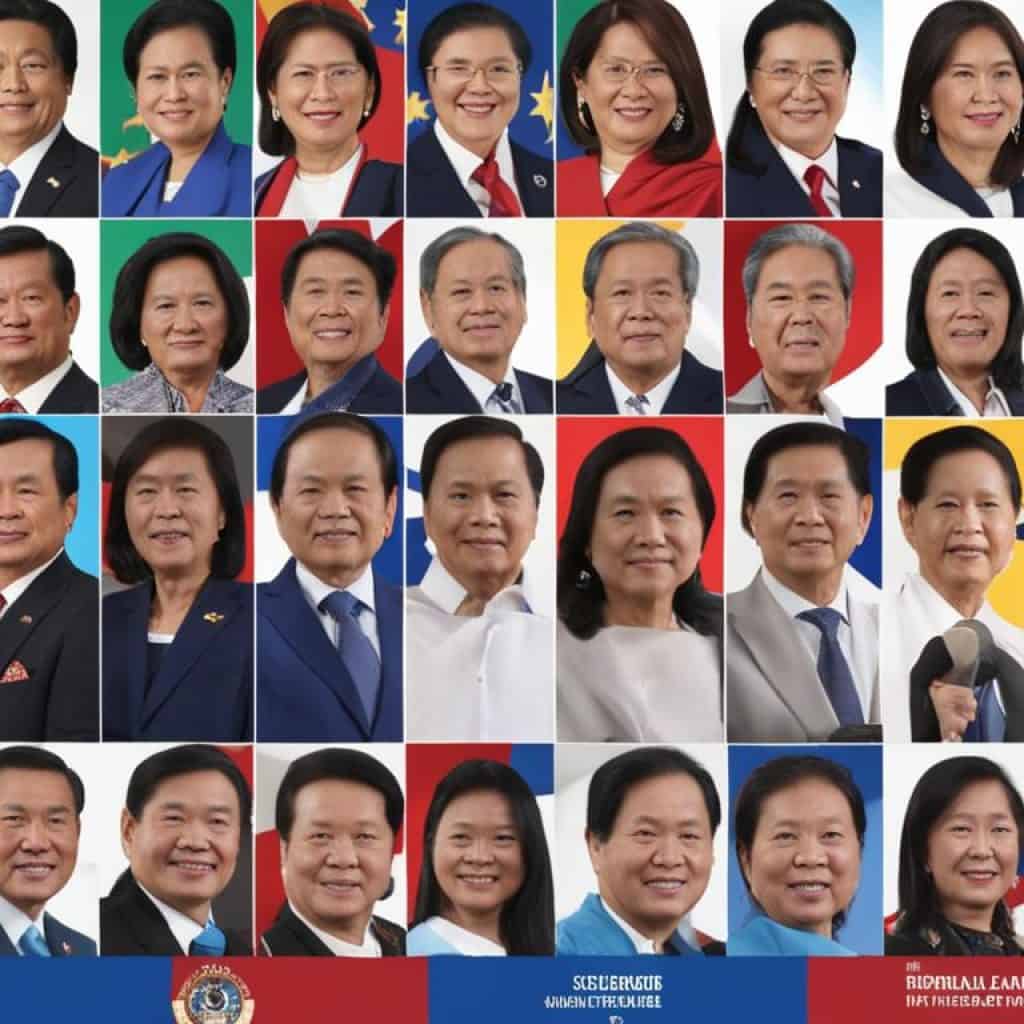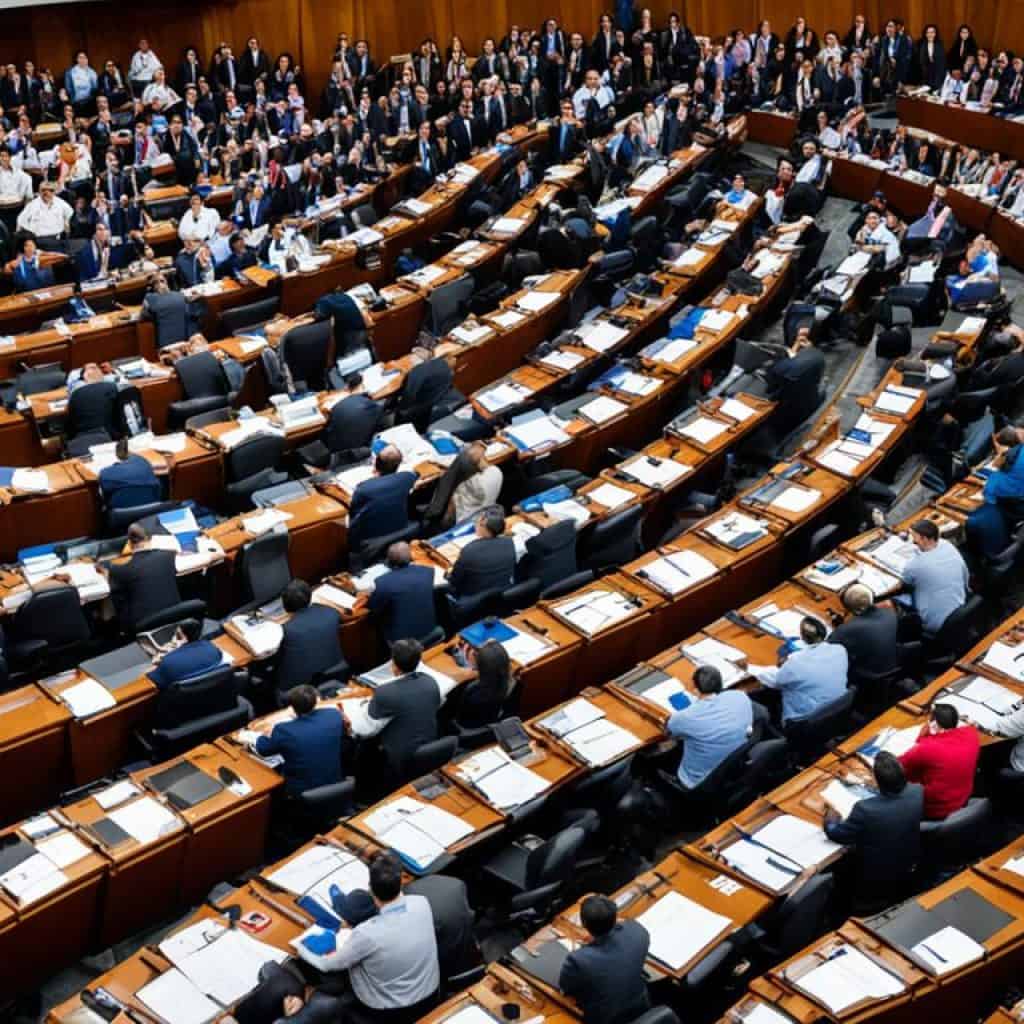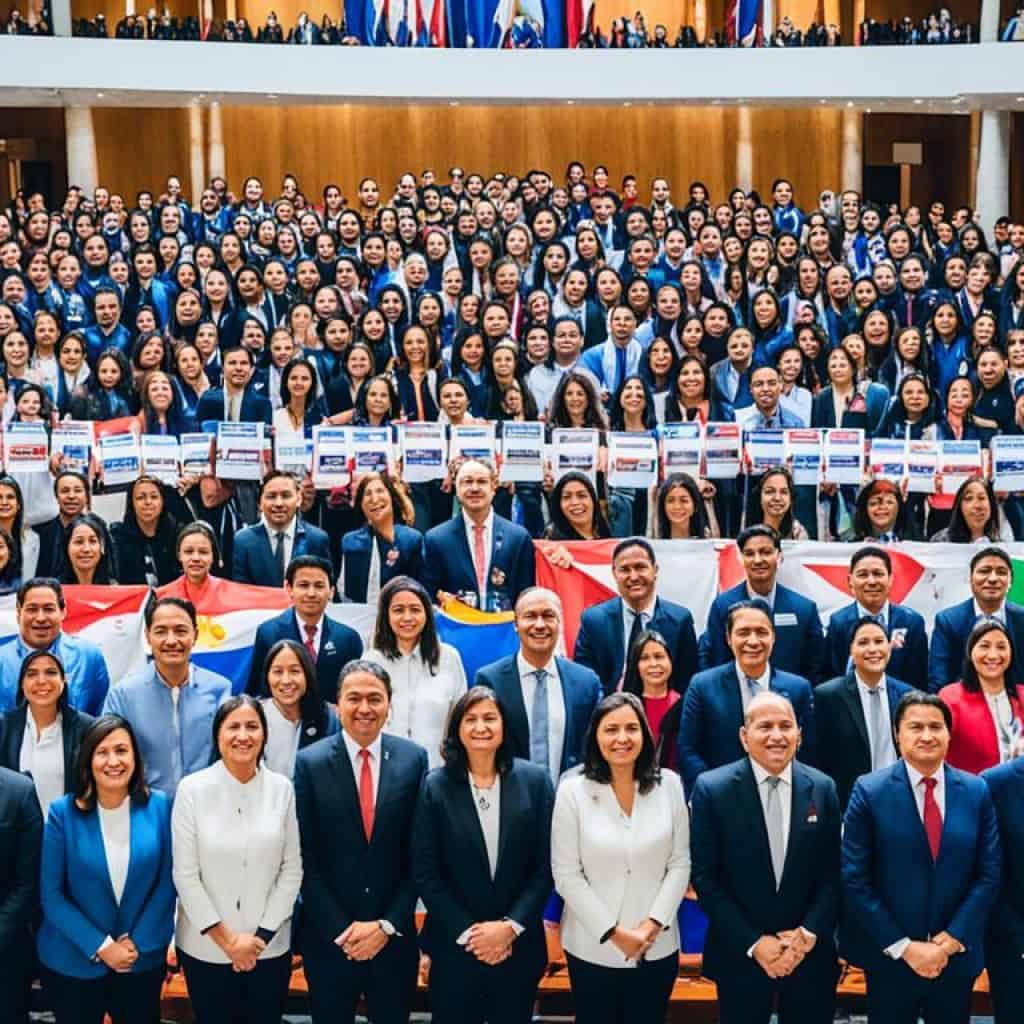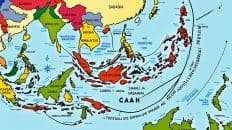Who are the influential individuals representing the Filipino people in the Philippines’ upper house of Congress? Gathered from various regions and elected to serve the nation, these 24 senators have the power to shape policies, make crucial decisions, and champion the interests of millions. Whether you’re curious about their names, their responsibilities, or their impact on national policies, this article will provide you with the insights you seek.
Key Takeaways:
- The 2024 Philippine Senate is composed of 24 senators elected at-large.
- The senators play a crucial role in lawmaking and policy formulation.
- They represent the interests and concerns of their constituents.
- The Senate is composed of both majority and minority blocs.
- Senators have made significant contributions to education, healthcare, infrastructure, and social welfare.
Role and Responsibilities of Senators
Senators in the Philippines have a crucial role in the legislative process, playing a significant part in lawmaking and policy formulation. They serve as representatives of the Filipino people, making decisions that directly impact the nation. Their responsibilities include proposing and enacting legislation, exercising their legislative duties, participating in committee hearings, and voting on important matters.
Senators have the authority to confirm executive appointments, ensuring that key positions in the government are filled by qualified individuals. They also play a vital role in the judicial process, as they have the power to try impeachment cases. This responsibility ensures that accountability and transparency are upheld in the government.
Furthermore, senators bear the duty of representing the interests and concerns of their constituents. They act as the voice of the people, advocating for their needs and aspirations. By engaging with their communities and listening to their constituents, senators can address pressing issues and champion reforms that improve the lives of the Filipino people.
Senators in the Philippines hold a position of immense responsibility, shaping legislation, safeguarding democratic processes, and ensuring the effective governance of the nation.
| Role and Responsibilities of Senators |
|---|
| Proposing and enacting legislation |
| Exercising legislative duties |
| Participating in committee hearings |
| Voting on important matters |
| Confirming executive appointments |
| Trying impeachment cases |
| Representing the interests and concerns of constituents |
Composition and Political Groups in the Senate
The Senate of the Philippines is composed of 24 senators who are elected at-large by the qualified voters of the country. Their representation reflects the diverse political landscape and ensures a fair and inclusive legislative process.
In the current Senate composition, there are 20 senators in the majority bloc and 2 senators in the minority bloc. The majority bloc consists of influential political groups such as the Nationalist People’s Coalition (NPC) and the Partido Demokratiko Pilipino-Lakas ng Bayan (PDP–Laban). These groups, along with other political parties, collaborate to advance their common interests and policy objectives.
- Nationalist People’s Coalition (NPC)
- Partido Demokratiko Pilipino-Lakas ng Bayan (PDP–Laban)
- Other political parties
The minority bloc, on the other hand, is comprised of senators from the PDP–Laban and Akbayan. They provide a critical perspective and serve as a check and balance to the majority bloc’s policies and initiatives.
The composition of the Senate is a reflection of the democratic principles that underpin the Philippine political system. The presence of majority and minority blocs ensures that various voices and interests are considered in the legislative process, promoting a more comprehensive and inclusive approach to governance.
In addition to the majority and minority blocs, there are also independent senators who do not align themselves with any specific political group. These independent senators provide a unique perspective and have the freedom to exercise their judgment in the best interest of the Filipino people.
It is through this diverse composition and the interaction of these political groups that the Senate embodies the democratic ideals of representation and negotiation, driving the legislative process forward to serve the needs and aspirations of the nation.
| Political Group | Number of Senators |
|---|---|
| Majority Bloc | 20 |
| Minority Bloc | 2 |
| Independent Senators | 2 |
Current Senators in the Philippines
Get to know the esteemed individuals who currently serve as senators in the Philippines. These senators represent various regions and sectors of the country, bringing their unique expertise and experiences to the legislative process. Let’s take a closer look at some of the prominent current Philippine senators:
Migz Zubiri
Migz Zubiri is a respected senator who has been serving in the Philippine Senate since July 25, 2022. Committed to public service, he plays a crucial role in shaping the country’s legislation and policies.
Loren Legarda
Loren Legarda is a highly influential senator known for her advocacy in environmental protection and sustainable development. She has made significant contributions to the nation through her legislative work.
Joel Villanueva
Joel Villanueva is a dedicated senator with a focus on labor issues and the improvement of the Philippine job market. He champions the rights and welfare of Filipino workers and implements policies that promote employment opportunities.
Koko Pimentel
Koko Pimentel is a seasoned senator who has been actively involved in shaping the nation’s laws and policies for several years. He is known for his work in promoting good governance and transparency in government.
These are just a few examples of the esteemed senators currently serving in the Philippines. Each senator brings their unique perspective and expertise to the table, contributing to the discussions and decision-making processes in the Senate.
| Senator | Political Party | Region |
|---|---|---|
| Migz Zubiri | Nacionalista Party | Mindanao |
| Loren Legarda | Nacionalista Party | Visayas |
| Joel Villanueva | Nacionalista Party | Luzon |
| Koko Pimentel | PDP-Laban | Mindanao |
Table: Senators in the Philippines
These senators collectively work towards the betterment of the nation, representing the interests of the Filipino people and making significant contributions to the legislative process.
Achievements and Contributions of Senators
Philippine senators have made remarkable achievements and significant contributions to the nation, playing a crucial role in shaping the legislative landscape and improving the lives of the Filipino people. Through their dedication and advocacy, senators have enacted important laws, leading to positive changes in various sectors.
One of the key achievements of Philippine senators is their role in addressing issues related to education. They have spearheaded legislation and initiatives aimed at improving access to quality education for all Filipinos. By advocating for increased funding, the implementation of scholarship programs, and the enhancement of educational facilities, senators have contributed to the development of a more inclusive and progressive educational system in the country.

Another area where senators have made significant contributions is healthcare. They have championed healthcare reforms, ensuring that every Filipino has access to affordable and quality healthcare services. By passing legislation that promotes universal healthcare coverage, enhances healthcare facilities, and supports medical research and development, senators have played a vital role in improving the overall health and well-being of the Filipino population.
Senators have also prioritized infrastructure development as a key aspect of national progress. Through their efforts, important infrastructure projects have been initiated and implemented, leading to improved transportation systems, connectivity, and overall economic growth. By advocating for the allocation of funds and the implementation of sustainable infrastructure plans, senators have contributed to the development of a more resilient and prosperous nation.
The welfare of the Filipino people has always been at the forefront of senators’ agenda, and they have worked tirelessly to address social welfare issues in the country. Senators have championed legislation and programs aimed at poverty alleviation, providing assistance to marginalized sectors, and empowering individuals and communities. Their efforts have resulted in tangible improvements in the lives of the less fortunate, fostering a more equitable society.
“The contributions of Philippine senators have undoubtedly shaped the future of the nation, addressing critical issues and paving the way for progress and development.”
The accomplishments of Philippine senators extend beyond these examples, as they have played a pivotal role in addressing a wide range of concerns and challenges faced by the Filipino people. Their work has left a lasting impact on the nation, influencing policies that directly affect the lives of millions.
Through their dedication to public service and their commitment to the well-being of the Filipino people, Philippine senators have exhibited exemplary leadership and have become catalysts for positive change. Their achievements and contributions embody the spirit of public service, serving as an inspiration for future generations.
Senate Committees and Their Functions
The Senate of the Philippines plays a crucial role in legislative processes, and this is facilitated through its 41 standing committees. These committees are responsible for overseeing and reviewing bills and resolutions, conducting investigations and inquiries, and formulating recommendations on important national issues. Each committee focuses on specific areas and has distinct functions and responsibilities.
Key Senate Committees
Let’s take a closer look at some of the key committees in the Philippine Senate:
- Committee on Finance: This committee is responsible for examining and controlling the government’s finances, including budgetary matters, revenue-raising measures, and government expenditures. It plays a critical role in ensuring fiscal responsibility and oversight.
- Committee on Education: The Committee on Education is dedicated to improving the country’s educational system. It examines legislative proposals related to education policies, promotes educational reforms, and ensures equal access to quality education for all Filipinos.
- Committee on Health: With a focus on public health, the Committee on Health examines legislation related to healthcare policies, healthcare services, and the promotion of public welfare. It plays a vital role in shaping initiatives aimed at improving the nation’s health and well-being.
- Committee on Justice and Human Rights: This committee is responsible for the review and deliberation of bills related to justice, human rights, and reforms in the legal system. It ensures the protection of constitutional rights and advocates for fair and just policies.
- Committee on Foreign Relations: The Committee on Foreign Relations handles matters related to the country’s international relations. It scrutinizes international agreements, treaties, and diplomatic appointments, ensuring that Philippine interests and concerns are well-represented in global affairs.
These committees, among others, are essential in the functioning of the Senate, as they provide a comprehensive framework for deliberating and proposing legislation, conducting investigations, and addressing key national issues.
| Committee | Function |
|---|---|
| Committee on Finance | Examines and controls government finances |
| Committee on Education | Focuses on improving the educational system |
| Committee on Health | Reviews healthcare policies and services |
| Committee on Justice and Human Rights | Deliberates on justice, human rights, and legal reforms |
| Committee on Foreign Relations | Handles international relations and agreements |
These committees reflect the Senate’s commitment to addressing a wide range of issues, ensuring that legislation and policies are thoroughly examined, and national interests are championed.
Legislative Process in the Senate
The legislative process in the Philippine Senate is a multi-stage journey that culminates in the creation of new laws. This process ensures that legislation undergoes careful scrutiny, debate, and refinement before it is enacted. Understanding how laws are made in the Senate is essential for comprehending the intricacies of governance in the Philippines.
At the heart of the legislative process is the filing of bills. Senators, driven by their commitment to address the needs of the Filipino people, propose bills that aim to address crucial issues and improve the lives of citizens. These bills cover a wide range of topics, such as education, healthcare, infrastructure, and social welfare.
Once a bill is filed, it undergoes thorough examination and discussion within the Senate committees. These committees, each focusing on specific policy areas, evaluate the merits of the bill and hold hearings to gather insights and perspectives from experts, stakeholders, and the public. The committees play a critical role in refining and shaping the proposed legislation.
Throughout the committee deliberations, senators collaborate, research, and engage in constructive discussions to ensure that the proposed laws align with the best interests of the Filipino people. This collaborative process allows for the identification of potential gaps, the consideration of diverse viewpoints, and the incorporation of amendments to strengthen the proposed legislation.
After the committee stage, the bill proceeds to the Senate floor for further examination and debate. This is where all senators have the opportunity to voice their opinions, articulate their concerns, and propose amendments. Floor debates allow for a comprehensive examination of the bill, ensuring that all perspectives are taken into account before reaching a consensus.

Once the debates are concluded, senators proceed to vote on the bill. A majority vote is required for the bill to be passed. This decisive moment showcases the collaborative efforts of senators, as they collectively determine the fate of the legislation.
“The legislative process in the Senate is a testament to the power of dialogue, collaboration, and the pursuit of the common good. Through careful examinations and robust debates, senators ensure that legislation accurately reflects the aspirations and needs of the Filipino people.”
Importantly, the legislative process in the Senate does not stop at its walls. Once a bill is successfully passed by the Senate, it proceeds to the House of Representatives for further examination and approval. This dual legislative process serves as a system of checks and balances, ensuring the thorough scrutiny of proposed laws.
The legislative process in the Philippine Senate embodies the commitment of senators to serve the Filipino people diligently. It is a testament to the democratic values and principles that underpin the country’s governance. By engaging in robust deliberations and informed decision-making, senators contribute to the development of laws that aim to uplift the lives of every Filipino citizen.
Influence and Impact of Senators on National Policies
Senators in the Philippines hold significant influence over national policies through their active participation in the legislative process. Their roles extend far beyond representing their constituents. Senators shape the country’s agenda by proposing bills, conducting investigations, and championing key issues that align with the needs and concerns of the Filipino people. By leveraging their positions, senators have the power to make a lasting impact on the governance and development of the nation.
One of the primary responsibilities of senators is to propose and enact legislation that addresses the pressing needs of the country. Through their unique perspectives and experiences, senators bring diverse ideas and solutions to the table, resulting in well-rounded policies that benefit the Filipino population as a whole. They utilize their expertise to analyze challenges and develop actionable strategies that address critical issues, such as education, healthcare, infrastructure, and social welfare.
Senators play a critical role in shaping national policies. They have the authority to propose bills, advocate for their passage, and champion key issues. Through their involvement in the legislative process, senators ensure that the policies enacted reflect the interests and concerns of the Filipino people.
Moreover, senators serve as representatives of their constituents, acting as a bridge between the citizens and the government. They engage in extensive consultations, listen to the public’s feedback, and initiate dialogues to understand the needs and aspirations of the Filipino people. Senators advocate for the voices of their constituents by making evidence-based arguments and proposing policies that directly address the challenges faced by their respective constituencies.
As elected officials, senators have a responsibility to consider the greater good of the nation while making policy decisions. They strive to strike a delicate balance between the diverse interests and perspectives within the country. By carefully weighing the potential benefits and consequences of proposals, senators aim to enact policies that promote the overall well-being and progress of the nation.
The impact of senators on national policies extends beyond policymaking. Their involvement in committee hearings, floor debates, and voting processes ensures a rigorous examination and evaluation of proposed legislation. This dedication to thorough scrutiny is essential to establish laws that are fair, just, and meet the needs of the Filipino people.
The influence and impact of senators on national policies cannot be underestimated. Their work is crucial in shaping the future of the Philippines, driving social progress, and ensuring the welfare of the Filipino people. Through their legislative efforts, senators have the power to create positive change and pave the way for a more prosperous and equitable society.
Senate and the Filipino People
The Senate of the Philippines plays a crucial role in representing the Filipino people. Senators are public servants elected to uphold the interests and welfare of the citizens they represent. They are accountable to their constituents and are expected to prioritize the needs of the Filipino people in their legislative work.
As public servants, senators have a responsibility to listen to the concerns and voices of the Filipino people. They play a critical role in ensuring that the voice of the people is heard and that their concerns are addressed through effective policymaking. Senators act as a bridge between the people and the government, advocating for their constituents and working towards the betterment of the nation.
Senators understand the diverse needs and interests of the Filipino people. They strive to create laws and policies that promote social justice, economic growth, and national development. Through their legislative work, senators aim to improve the lives of the citizens they represent and contribute to building a stronger and more prosperous nation.
The Senate enacts laws, deliberates on important national issues, and ensures a check and balance in the legislative process. By representing the interests of the Filipino people, senators help shape the policies that affect the lives of millions of individuals. They work towards creating an inclusive and equitable society, where every citizen has the opportunity to thrive and succeed.
Senators have the privilege and responsibility of serving as public servants. They are entrusted with the task of making informed decisions that benefit the Filipino people and contribute to the overall development of the nation.
Through their dedication and commitment, senators demonstrate their role as public servants and champions of the Filipino people. They work tirelessly to address the pressing issues that the nation faces, such as poverty, education, healthcare, and infrastructure development.
Senators are advocates for progress, justice, and equality. They strive for the common good and work towards creating a brighter future for the Filipino people. Their efforts in representing the interests of the citizens they serve demonstrate their commitment to the principles of democracy and good governance.
| Role of the Senate | Responsibilities of Senators |
|---|---|
| 1. Enacts laws | 1. Upholding the interests and welfare of the Filipino people |
| 2. Deliberates on important national issues | 2. Listening to the concerns and voices of the Filipino people |
| 3. Ensures a check and balance in the legislative process | 3. Advocating for the needs and rights of constituents |
| 4. Represents the interests of the Filipino people | 4. Working towards the betterment of the nation |
Senators, as public servants, have the opportunity to make a lasting impact on the lives of the Filipino people. By serving with integrity, compassion, and a strong sense of duty, they contribute to the nation’s progress and inspire trust and confidence among the citizens they represent.

Challenges Faced by Senators
Being a senator comes with numerous challenges and obstacles that legislators and public servants must navigate. Senators are tasked with balancing the needs and interests of various stakeholders, managing political pressures, and addressing complex policy issues. These challenges require a high level of skill, dedication, and integrity to overcome. Let’s explore some of the difficulties senators face in their work.
Balancing Stakeholder Needs
One of the greatest challenges for senators is finding a balance between the diverse needs and interests of their constituents. With a multitude of perspectives and priorities, senators must carefully consider the implications of their decisions on different groups. It’s a delicate task to ensure that legislation benefits the majority while also addressing the concerns of minority voices.
Navigating Political Pressures
Senators often face immense political pressures that can influence their decision-making process. Partisan politics, party affiliations, and the pursuit of personal or party agendas can complicate the legislative process. Senators must navigate these pressures while staying true to their principles and ensuring that their actions serve the best interests of the Filipino people.
Addressing Complex Policy Issues
The work of senators involves dealing with complex policy issues that require in-depth understanding and expertise. Crafting effective legislation on topics such as education, healthcare, infrastructure, and social welfare demands extensive research, analysis, and collaboration with experts. Senators must grapple with these complexities to propose thoughtful and meaningful solutions for the benefit of the nation.
Public Scrutiny and Expectations
Senators operate under the constant scrutiny of the public and media. Their actions, statements, and decisions are subject to intense scrutiny and public judgment. Maintaining public trust and meeting the expectations of the Filipino people can be challenging, as senators must demonstrate transparency, accountability, and ethical conduct in their roles as public servants.
“The work of a senator is a constant balancing act, navigating between the needs of diverse stakeholders, political pressures, and complex policy issues. It requires strong leadership, integrity, and a deep commitment to serving the Filipino people.”
Overcoming these challenges demands tenacity, resilience, and the ability to make difficult decisions for the greater good. Despite the obstacles, senators play a vital role in shaping the future of the Philippines and driving positive change for the nation and its citizens.
Future Outlook and Expectations for Senators
The future of the Philippine Senate holds great promise as senators continue to play a pivotal role in shaping the nation’s future. Expectations for senators include continued dedication to public service, strong leadership skills, and a commitment to good governance. As the country faces various socioeconomic challenges, senators are expected to address these issues through effective legislation and policies that promote the well-being and development of the Filipino people.
Serving as representatives of the Filipino people, senators have the power to make a lasting impact on the nation’s governance and development. They have the opportunity to bring about positive change and contribute to the betterment of society. The people look to these senators to be their voice, to champion their concerns, and to lead with integrity and excellence.
“The future belongs to those who believe in the beauty of their dreams.” – Eleanor Roosevelt
Senators must have a strong vision for the Philippines and the determination to turn their vision into reality. They should strive to create a future where every Filipino has access to quality healthcare, education, and livelihood opportunities. By crafting and passing legislation that addresses the pressing needs of the nation, senators can pave the way for progress and ensure a brighter future for all.
Moreover, the expectations for senators extend beyond their role as lawmakers. They must also serve as role models and exemplify the values of integrity, transparency, and accountability. Building a strong public trust and maintaining open lines of communication with their constituents are crucial for effective representation.
The future outlook for senators also involves harnessing the power of technology and innovation to drive positive change. By embracing digital transformation and leveraging technological advancements, senators can enhance their legislative work and engage with the Filipino people more effectively.
In conclusion, the future of the Philippine Senate holds immense potential for senators to shape the destiny of the nation. The expectations for senators encompass dedication to public service, strong leadership, and a commitment to addressing the challenges that lie ahead. As senators rise to the occasion and fulfill their responsibilities, they have the opportunity to guide the Philippines towards a prosperous and inclusive future.
Public Perception and Trust in Senators
Public perception of senators and their trustworthiness varies among individuals. While some people have a favorable view of senators and trust their ability to serve the public interest, others may harbor doubts and reservations. Trust in Philippine senators can be influenced by a range of factors including political controversies, allegations of corruption, and perceived shortcomings in their performance.
It is essential for senators to uphold high ethical standards, exercise transparency, and deliver on their promises to the Filipino people in order to build and maintain public trust. By demonstrating integrity in their actions and decisions, senators can work towards restoring faith and confidence in their ability to serve as effective public servants.
“The trust of the innocent is the liar’s most useful tool.” – Stephen King
Transparency plays a vital role in fostering trust. Senators can enhance transparency by providing regular updates on their activities, disclosing potential conflicts of interest, and engaging in open and honest communication with the public. By doing so, they can foster a sense of accountability and enable the public to assess their performance objectively.
Examples of Building Trust and Perceptions
To illustrate the significance of building public trust, here are a few examples:
- Regular town hall meetings: Senators can organize town hall meetings to engage directly with the public, listen to their concerns, and address their questions and feedback.
- Efficient use of resources: Senators who demonstrate responsible and efficient use of public resources can instill confidence in their ability to manage public funds effectively.
- Collaborative decision-making: Senators who actively involve stakeholders and seek input from experts and the public in the decision-making process are more likely to be perceived as inclusive and trustworthy.
Through these efforts, senators can work towards improving public perception and trust in their role as representatives of the Filipino people.
Public Perception and Progress Table
| Perception Category | Public Perception | Progress and Improvement |
|---|---|---|
| Corruption Allegations | Some senators are tarnished by corruption allegations, leading to a decrease in public trust. | Implement measures such as stricter financial disclosures and stronger ethical codes to combat corruption and rebuild public trust. |
| Performance and Accountability | The public may perceive senators as ineffective or unresponsive to their needs. | Enhance transparency by providing progress reports, responding to public inquiries, and actively seeking feedback on legislative initiatives to demonstrate accountability. |
| Communication and Engagement | Lack of effective communication and engagement with the public can lead to misunderstandings and mistrust. | Establish regular channels of communication, such as public forums and social media platforms, to foster open dialogue and ensure the public is well-informed about senators’ work. |
By addressing these concerns and actively working towards rebuilding trust, senators can bridge the gap between public perception and their role as representatives of the Filipino people. It is essential for senators to continuously evaluate their performance and prioritize the interests and welfare of the nation in order to earn and maintain the trust of the public they serve.
Role of Senators in Nation Building
Senators play a crucial role in nation building by enacting legislation, advocating for policies, and representing the interests of the Filipino people. Their contributions to the nation’s progress are significant and can be seen across various sectors that impact the daily lives of the citizens. Through their dedication to public service and commitment to the well-being of the nation and its citizens, senators work tirelessly to build a stronger and more prosperous Philippines.
Senators are instrumental in enacting legislation that shapes the socioeconomic development of the nation. They propose and pass laws that address critical issues such as education, healthcare, infrastructure, and social welfare. By crafting effective policies and championing their implementation, senators contribute to creating a better future for all Filipinos.
Furthermore, senators play a pivotal role in advocating for the interests of their constituents. They serve as the voice of the people in the legislative process, ensuring that their concerns are heard and addressed. Senators represent diverse regions and sectors, allowing them to bring a wide range of perspectives to the table and shape policies that reflect the needs and aspirations of the Filipino people.
Senators also hold the responsibility of overseeing the effective implementation of government programs and projects. Through their oversight functions, they ensure transparency, accountability, and the proper use of public resources. By exercising their legislative and oversight powers, senators contribute to effective governance and the sustainable development of the nation.
In conclusion, the role of senators in nation building cannot be underestimated. Their contributions in enacting legislation, advocating for policies, and representing the interests of the Filipino people shape the trajectory of the nation’s development. With their dedication and commitment to public service, senators play a vital role in building a brighter future for the Philippines and its citizens.
Conclusion
The 24 Philippine senators of 2024 play a crucial role in shaping the nation’s future through their legislative work. They are entrusted with the responsibility of representing the Filipino people and advocating for their interests in the Senate. These senators make important decisions that impact the lives of millions and contribute to the overall development of the country.
The Senate of the Philippines, as an essential part of the Philippine governance system, ensures a check and balance in the legislative process. The dedication, commitment, and contributions of the senators are vital in forging a better future for the nation and its people. Through their work, senators address key issues, propose legislation, and champion policies that promote socioeconomic progress.
The summary of Philippine senators highlights their significant roles, from enacting laws and formulating policies to addressing the concerns and needs of their constituents. The senators represent a diverse range of regions and sectors, bringing their unique expertise and experiences to the legislative process. Their achievements and contributions have a lasting impact on the nation, shaping the legislative landscape and influencing policies that ultimately benefit the Filipino people.














Add comment